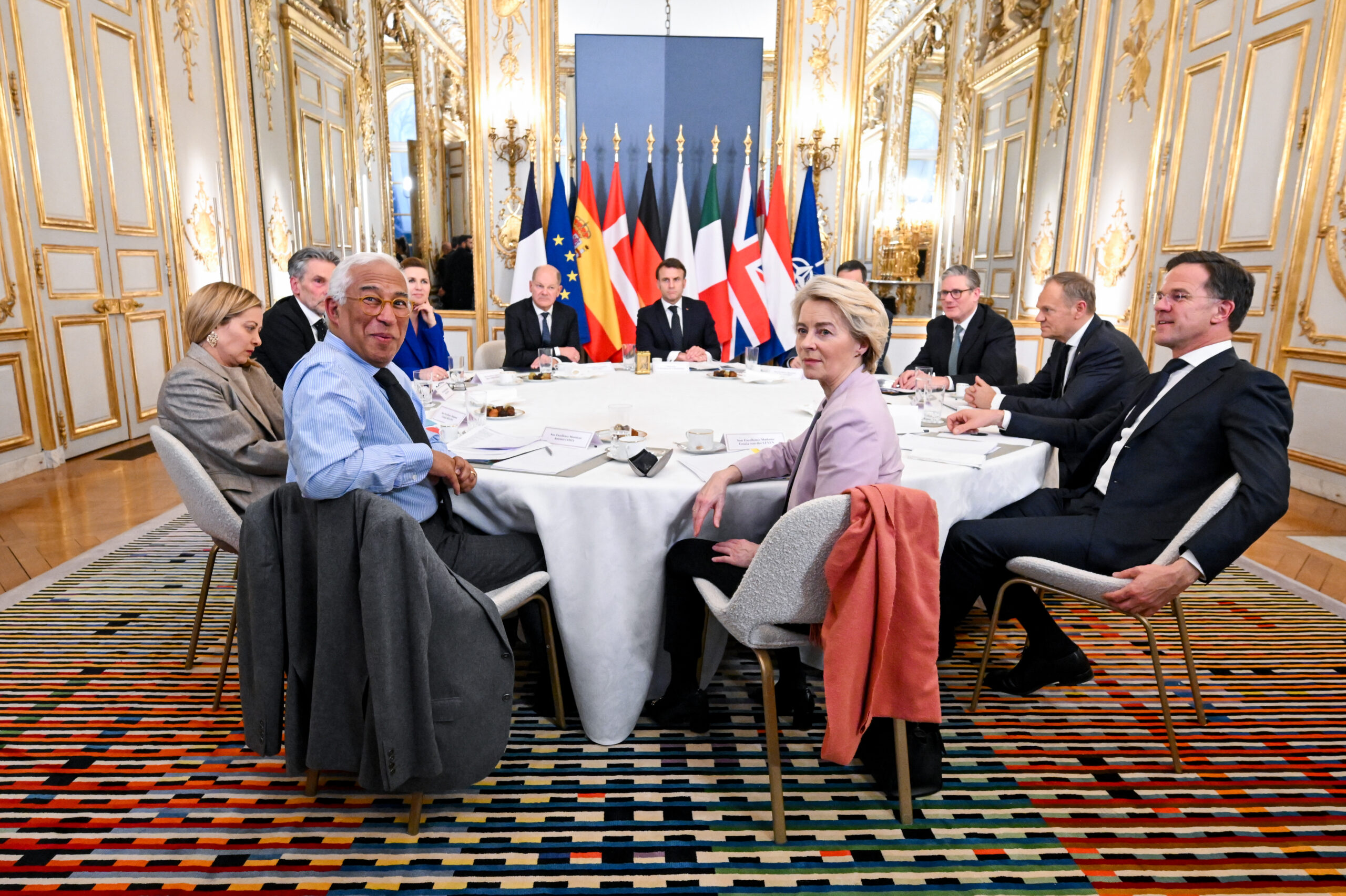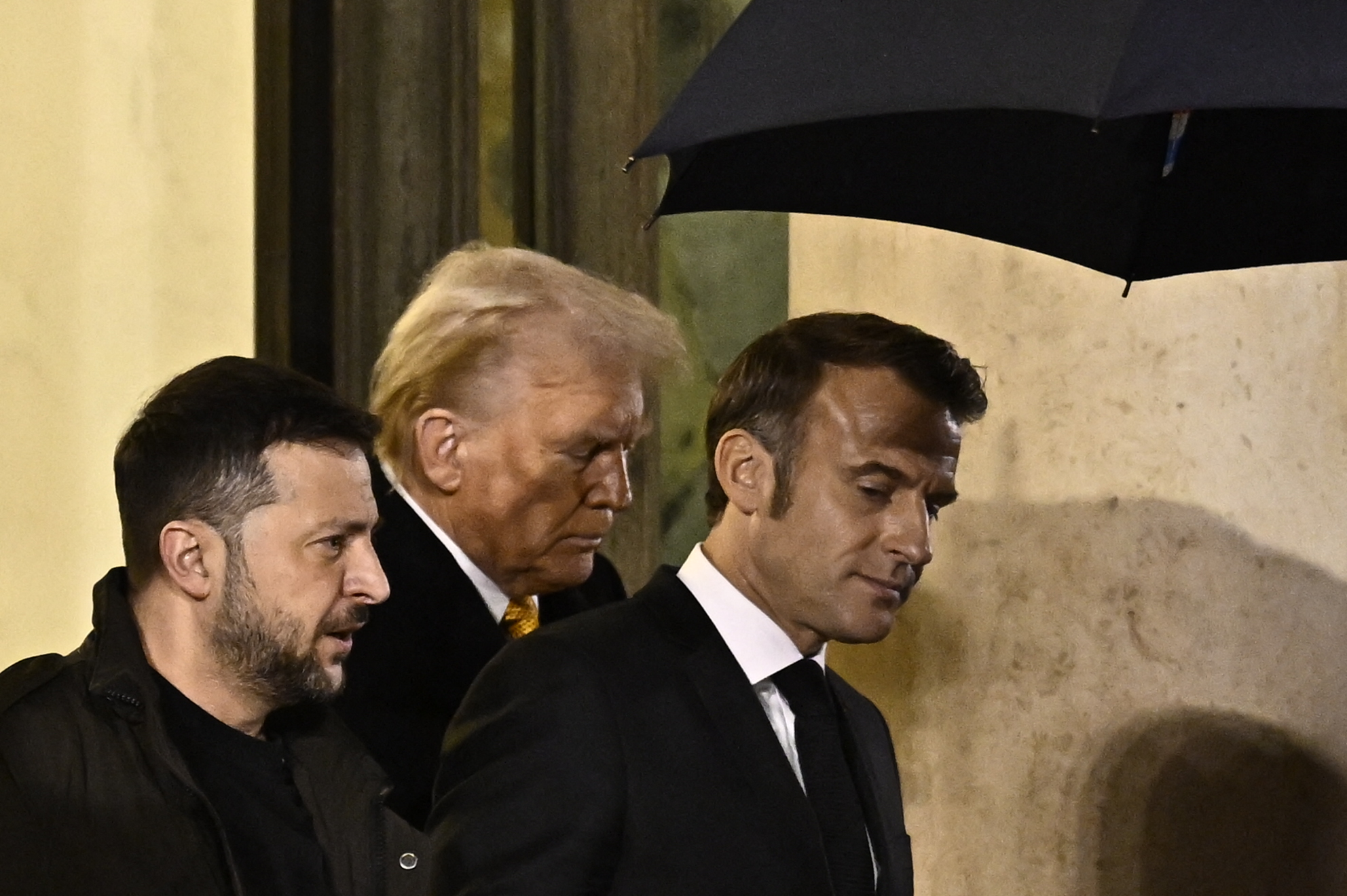Brussels – A day after the European summit in Paris on Ukraine, the EU is trying to pull its American ally along, while it has already sent Secretary of State Marco Rubio to Riyadh to kick off superpower negotiations with Russia. The desperate attempt not to be cut off is entrusted to Ursula von der Leyen and Antonio Costa – who hosted the US envoy for Ukraine, Keith Kellogg, in Brussels today – but also to the diplomatic initiatives of French President Emmanuel Macron, who yesterday personally briefed Trump and Zelensky on the exclusive Elysée meeting.
The bilateral meetings between EU leaders and Kellogg were initially scheduled for yesterday, but the emergency summit that Macron called inevitably changed the agenda. Regarding support for Ukraine, “financially and militarily, Europe has brought more to the table than anyone else,” von der Leyen told the American diplomat. A total commitment of 135 billion euros (about $145 billion), including $52 billion in military assistance, “matching US contributions,” and generally “more than any other ally,” the European Commission stressed in a statement on the sidelines of the meeting.
And – faced with threats of US disengagement – the EU “stands ready to do even more.” Von der Leyen also outlined to Kellogg the plans of the 27 member states to increase production and defense spending, strengthening the military capability of both Europe and Kyiv. In this respect, something is moving: the EU leader announced last week the suspension of the new Stability and Growth Pact rules to allow member states to invest more in defense. In its Defense White Paper, which is due to be announced on March 19, the EU executive will outline the strategy to raise the bar and appease overseas irritation over a long-standing imbalance in military spending.

Von der Leyen and Costa reiterated to Kellogg their willingness to sit at the negotiating table, working “alongside the United States” and in a “constructive” manner to “end the bloodshed and help secure the just and lasting peace that Ukraine and its people rightfully deserve.”
On the sidelines of the meeting, Costa stressed once again that “peace cannot be a simple ceasefire” but an agreement that “guarantees a comprehensive, just and lasting peace in Ukraine and security in Europe.” Nothing leaked from Kellogg except a brief post on X about the “great discussions this morning in Brussels with EU President Costa.” Trump’s special envoy for Ukraine did not mention the meeting with von der Leyen.
Whether Kellogg–who will be in Kyiv on Thursday, February 20–reassured Brussels about the bilateral negotiations staged with Russia is unknown. During the daily press briefing, European Commission spokesman Stefan De Keersmaecker repeated several times that “we are at the beginning of a process in which several meetings are taking place” and that there is no doubt that no peace can be sealed without Brussels and Kyiv at the table.

From left: Ukrainian President Volodymyr Zelensky, US President-elect Donald Trump, and French President Emmanuel Macron in Paris, December 7, 2024 (photo: Julien De Rosa/Afp)
Meanwhile, Macron last night tried to pull the EU out of the shadow into which Trump and Putin relegated it. After a summit at the Elysee Palace with the heads of state and government of Italy, the Netherlands, Denmark, Germany, Spain, the United Kingdom, and Poland, the NATO Secretary General, von der Leyen, and Costa, the French president spoke on the phone first with Trump and then with Volodymyr Zelensky. “We seek a strong and lasting peace in Ukraine. To achieve it, Russia must end its aggression, and this must go with strong and credible security guarantees for Ukrainians,” Macron said on the sidelines of the talks. On such guarantees, “we will work on this together with all Europeans, Americans, and Ukrainians,” he added. But the impasse is right here: the EU capitals present at the Elysée Palace have been very skeptical about deploying military personnel to Ukraine, especially without a simultaneous US commitment, while Moscow – and so far Washington – categorically rule out the presence of soldiers under the Atlantic Alliance umbrella.
After his phone call with the Elysee, Zelensky wrote on X, “We share a common vision: security guarantees must be solid and reliable. Any other decision without such guarantees, such as a fragile ceasefire, would be nothing but further deception by Russia and a prelude to a new Russian war against Ukraine or other European nations.”
English version by the Translation Service of WithubGreat discussions this morning in Brussels with EU President Costa @eucopresident. https://t.co/BRrO8eRFx2
— Keith Kellogg (@generalkellogg) February 18, 2025


![[foto: European Council]](https://www.eunews.it/wp-content/uploads/2025/03/euco-250320-350x250.jpg)







![Irene Tinagli (Pd/S&D), presidente della commissione speciale Crisi abitativa nell'Ue [Bruxelles, 24 marzo 2025. Foto: Emanuele Bonini per Eunews]](https://www.eunews.it/wp-content/uploads/2025/03/tinagli-250324-120x86.jpeg)
